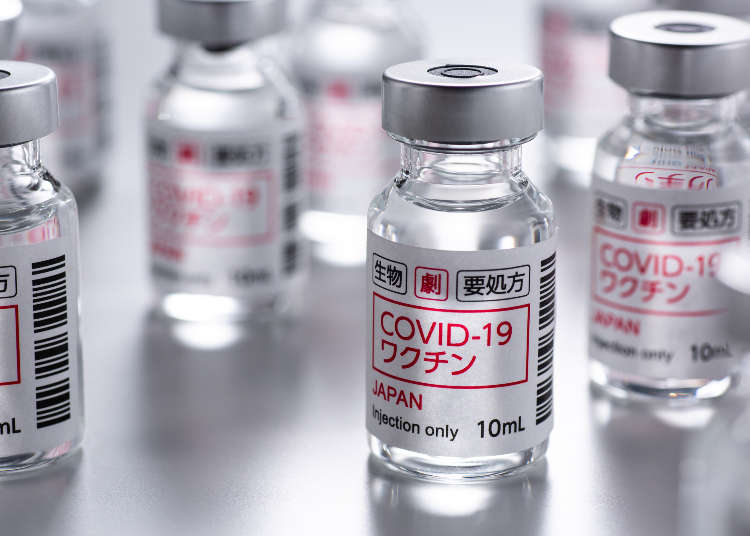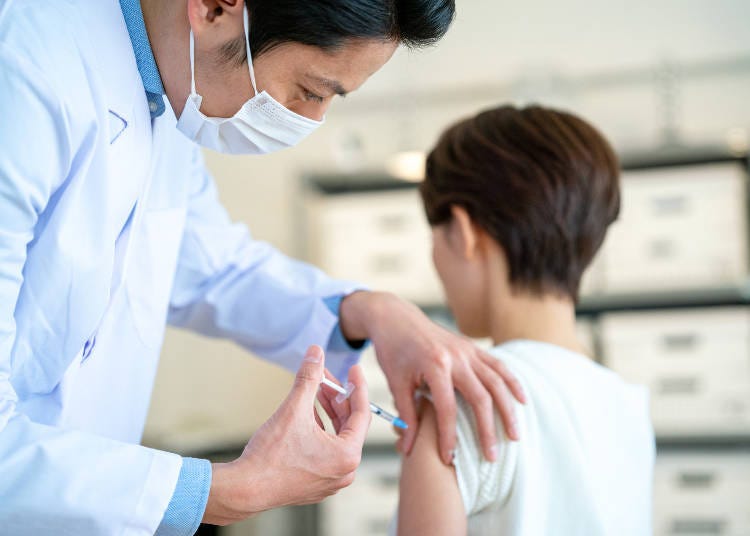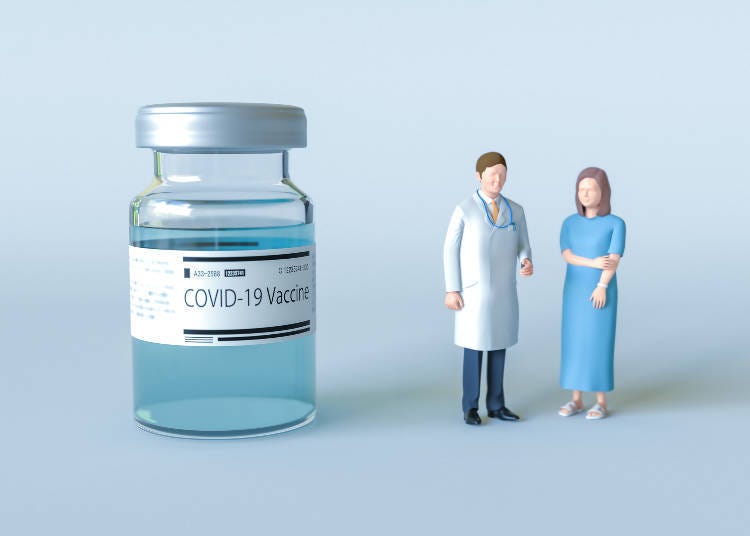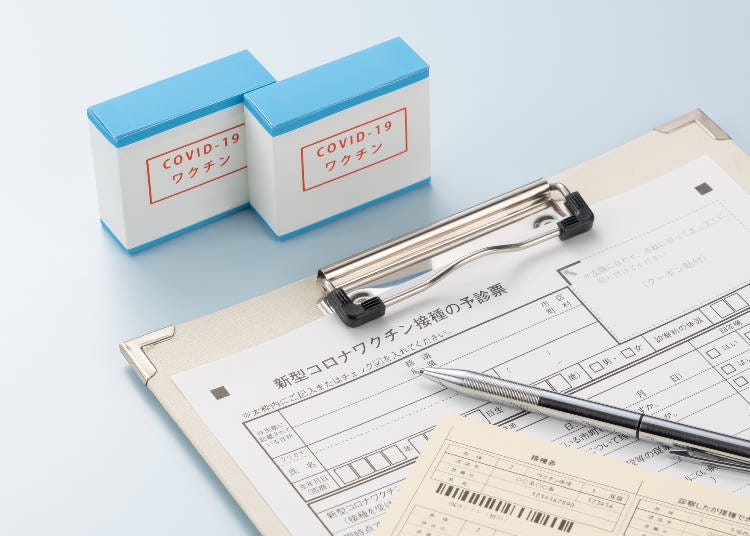
Basic Information Regarding Covid-19 Vaccine for Foreigners in Japan (As of June 2021)
- Written by: Ran Tanaka
The rollout of the Covid-19 vaccine in Japan has been increasingly speeding up. This has raised some questions such as: Can foreign residents also get the coronavirus jab and does it cost anything?
Here we’ve prepared a guide to some basic information on the vaccine for foreign residents living in Japan in the form of a Q&A.
How to Get the Coronavirus Vaccine in Japan

Q. Who is currently getting vaccinated in Japan?
A. From June 17, 2021, anyone over the age of 18 with a vaccination ticket can make a reservation at one of the large-scale facilities located in the Tokyo and Osaka area.
At present, the number of shots administered per day has surpassed the target number originally set by the Japanese government at over one million. Moreover, it was announced that over ten million people had gotten their second shot (as of June 24th).
Q. What are large-scale vaccination centers?
A. Organized by the Ministry of Defense, large-scale vaccination centers refer to the big centers for Covid-19 vaccines in the Tokyo and Osaka area. You can make a reservation over the phone, on their website, or by accessing their LINE account.
Overall, there are four such facilities in the Tokyo area. This includes one in Tokyo, one in Saitama Prefecture, one in Chiba Prefecture, and one in Kanagawa Prefecture. Facilities in the Osaka area include one in Osaka Prefecture, one in Kyoto Prefecture, and one in Hyogo Prefecture.
At first, these facilities were only accessible to residents over the age of 65. However, starting June 10th, having residency in these regions no longer became a requirement, and anyone living in Japan can now get the shot.
From June 17th, vaccinations became available for those under the age of 64. (This only applies to those with a vaccination ticket from the government who are getting their first shot.)
Q. How do you make a reservation at one of the large-scale facilities?
A. You can check the current reservation status on the Ministry of Defense’s website. Details can be found on the Overview of Large-scale Vaccination Centers, Reservation Guide (reservation, reception) page.
When there’s a cancellation, a new slot opens. Because you can make a reservation until 11:59 p.m. the night before, those waiting for cancellations should check the status on this website’s page.
Q. Are vaccinations mandatory for everyone living in Japan?
A. Getting the Covid-19 vaccine is not mandatory, but they’re highly recommended by the Ministry of Health, Labour and Welfare. Vaccinations cannot be administered without full consent from the patient.
Q. What are occupational vaccine services (workplace vaccinations)?
This refers to vaccinations provided by a company or school. The service started on June 21 and offers the Moderna vaccine.
While you can get a shot without a vaccination ticket, you must have acceptable valid identification.
Please keep in mind that with this service, vaccination facilities are organized by companies, etc. This means that you cannot get one at a country or government-organized vaccination center. Additionally, you can still choose whether or not to get a vaccine, even if it’s administered by your company or school.
*As of June 25th, the Ministry of Health, Labour, and Welfare has closed any new applications for occupational vaccine services.
■ Types of Covid-19 Vaccines in Japan and Potential Side Effects

Q. What are the types of Covid-19 vaccines found in Japan?
A. The two types of vaccines currently supplied to Japan are Moderna from Takeda Pharmaceuticals and Pfizer. Pfizer is for those 12 years of age and older, and Moderna is for those over the age of 18 (by the vaccination day).
Q. Can you choose which vaccine to get?
A. In most cases, you cannot choose the type of vaccine you get. Furthermore, you must take the same vaccine for the first and second shots.
For information on the types of vaccines in Japan, please refer to the What are the types of Covid-19 vaccinations found in Japan? question above.
Q. What are the side effects? Do they differ depending on the vaccine?
A. It has been announced that the vaccines currently administered in Japan may have the following side effects.
・Pain in the area where you got the shot, fatigue, headaches, muscle and joint pain, chills, diarrhea, fever, etc.
Most of these side effects should go away within the first couple of days of getting the shot.
Q. Are there any symptoms of anaphylaxis? What can you do to prevent this?
Anaphylaxis refers to a severe reaction to an acute allergy. Cases of experiencing anaphylaxis are very rare. Due to this, and because it hasn’t been acknowledged as something of great worry, there haven’t been any changes made to the vaccine.
If such symptoms (e.g., wheezing or difficulty breathing) occur, medicine can be found at vaccination centers and medical institutions. You must remain at these facilities for at least 15 to 30 minutes after getting your shot to ensure that you don’t have any side effects.
Q. What should you do if you experience side effects after the vaccine?
A. There is a relief system in place. The Vaccination Act, established by the Ministry of Health, Labour and Welfare, enables you to receive certain benefits if you feel unwell after getting the vaccine.
For more information on these benefits, please visit the Ministry of Health, Labour, and Welfare’s Relief System for Injury to Health with Vaccinations page.
■ Getting the Covid Vaccine in Japan as a Foreign Resident

Q. Can foreign residents living in Japan get the Covid vaccine?
A. In principle, all foreign residents of Japan can get the vaccine. There are even some government websites that provide guides to getting the vaccine in foreign languages. We recommend those who want more information on the current status or method to take a look at these sites.
Q. Is there a charge for the Covid vaccine?
A. Everyone can get the vaccine for free.
Q. How do you get vaccinated in Japan?
A. A vaccination ticket should arrive at your registered address from your local government. Depending on the municipality, there may be a slight delay in the arrival of the vaccination ticket. However, on their website, the Ministry of Health, Labour and Welfare assures that everyone will get a ticket and asks that you wait patiently.
Q. How do you prove that you got the vaccine?
A. After getting the vaccine, you will receive a vaccine certificate with all the necessary information listed. In the case that you lose the certificate, you can contact your local government to reissue it.
Depending on your municipality, you may be able to ask for an English version (please check in advance). Because some municipalities take time to run a background check with the institution where you got the vaccine, we recommend applying for the English certificates in advance. This process may take up to two to three months.
The government is also currently working on creating a digital vaccine passport for your smartphone. This document will state your name, nationality, passport number, and the day you were vaccinated.
Q. What do you do when you want information on the vaccine in your own language?
A. For information in foreign languages, please visit the Information on Covid-19 section of the Ministry of Health, Labour and Welfare’s website.
Q. Covid-19 Helplines in Foreign Languages
A. There is a foreign language guide for information regarding Covid-19 on the Ministry of Health, Labour and Welfare’s website. Here you can find information in 21 languages from different countries and regions (as of June 24th).
Q. If you experience any workplace harassment over your vaccination status
A. You can contact the Consulting Service for Foreign Workers provided by the Ministry of Health, Labour and Welfare. It is free, requires no reservation, and ensures confidentiality. If it’s difficult to consult your workplace when experiencing issues, please feel free to visit this office. For information on its location, please check the Ministry of Health, Labour and Welfare’s website.
As a foreign resident, you can get the vaccine the same as anyone else living in Japan. There is a lot of information in foreign languages provided by Japan and its municipalities, so please feel free to take a look.
*The information found in this article is from June 24th. For updated information, please check your municipality’s website or the Ministry of Health, Labour and Welfare’s website.
Sources:
Q&A Regarding the Coronavirus Vaccine/Ministry of Health, Labour and Welfare(Japanese)
Novel Coronavirus (COVID-19)/Ministry of Health, Labour and Welfare
COVID-19 Multilingual Guide/Ministry of Health, Labour and Welfare
Telephone Consultation Service for Foreign Workers/Ministry of Health, Labour and Welfare
Ran Tanaka is a Japanese writer and travel agency employee. After working as an editor for a major website, she switched to a travel company. She specializes in travel and food-related genres, and she has covered all 47 prefectures in Japan. She regularly travels to report on hidden gems, scenic spots, and the kinds of travel tips that only a travel industry insider can know.
*Prices and options mentioned are subject to change.
*Unless stated otherwise, all prices include tax.
Popular Tours & Activitiess
Recommended places for you
-
Goods

Yoshida Gennojo-Roho Kyoto Buddhist Altars
Gift Shops
Nijo Castle, Kyoto Imperial Palace
-

ISHIDAYA Hanare
Yakiniku
Kobe, Sannomiya, Kitano
-

Kambei Sannomiyahonten
Yakiniku
Kobe, Sannomiya, Kitano
-

Kanzenkoshitsuyakinikutabehodai Gyugyu Paradise Sannomiya
Yakiniku
Kobe, Sannomiya, Kitano
-

Jukuseiniku-to Namamottsuarera Nikubaru Italian Nikutaria Sannomiya
Izakaya
Kobe, Sannomiya, Kitano
-
Appealing

Rukku and Uohei
Izakaya
Sapporo / Chitose
-

Tokyo City Pass Upgrade: Harry Potter Studio Tour & Top Sights up to 85% Off
by: Guest Contributor
-
Ad

Preserving the Beauty of World Heritage Site Shirakawa-go for the Future Through Responsible Travel
-

A Travel Game Changer! Go Hands-Free Between Tokyo and Kyoto with LUGGAGE EXPRESS by JTB and JR Tokai
by: Guest Contributor
-

Keisei × Keikyu 16-Temple Goshuin Tour: Discover Deeper Tokyo & Yokohama
by: Guest Contributor
-

Simply Oishii Wagashi School Discover Japanese Culture Through Wagashi: A Hands-On Experience!
by: Guest Contributor
-

How to Get Don Quijote's Exclusive 2025-2026 Winter Gift (+Tax-Free Savings)
-

Tokyo is a Winter Shopping Paradise! 10 Popular Spots Recommended by Travelers For 2024
-

Racing Across Japan in the Joetsu Shinkansen: From Tokyo to Niigata's Sake Country In Style
-

10 Surprising and cool things you didn’t know about Akihabara
-

All Aboard the Sagano Romantic Train: Kyoto's Famous Sightseeing Ride Through a Tunnel of Colors (2025 Guide & Tickets)
by: WESTPLAN
-

Tokyo Trip: Most Popular Discount Stores in Tokyo and Surroundings (August 2019 Ranking)
-

Kaminoyama Onsen Guide: Best Things to Do in Japan's Samurai Town!
- #best sushi japan
- #what to do in odaiba
- #what to bring to japan
- #new years in tokyo
- #best ramen japan
- #what to buy in ameyoko
- #japanese nail trends
- #things to do japan
- #onsen tattoo friendly tokyo
- #daiso
- #best coffee japan
- #best japanese soft drinks
- #best yakiniku japan
- #japanese fashion culture
- #japanese convenience store snacks













